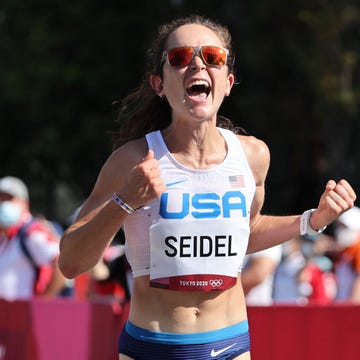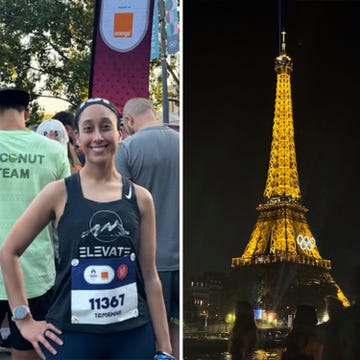We may earn commission from links on this page, but we only recommend products we back Athing Mu won the women’s 800-meter Olympic title in 1:55.21 on August 3 in Tokyo. The 19-year-old is the first American gold medalist in the event since Madeline Manning Mims in 1968. Her time is the new American record.
Keely Hodgkinson of Great Britain, also age 19, was second in a national record of 1:55.88, and American Raevyn Rogers used her trademark fast finish to win the bronze in a personal best of 1:56.81. In all, six of the eight women in the field set personal bests.
“Being an Olympic gold medalist, that’s insane,” Mu said. “But I knew this was possible.”
Mu led as the field broke from their lanes into the backstretch. She set a strong but not crazy-fast pace, covering the first lap in 57.82, with the rest of the field in close pursuit. Mu opened a slightly larger lead with less than 300 meters to go, but still ran controlled.
Only in the final straight did she clearly pull away. Mu ran the second lap in 57.39, slightly faster than the first lap, which is a rarity in a non-tactical world-class 800.
“I don’t want to leave anything up to chance,” she said about her front running. “I don’t want to get into a race and not do what I can and mess up my chances of meeting my goals.”
Behind Mu, places shifted quickly, as Britain’s Jemma Reekie, who was second with 100 meters to go, tied up in the final 30 meters, while Hodgkinson surged into second. Rogers was next to last coming off the final turn, but moved to the outside and managed to inch past Reekie to claim third place. Rogers used a similarly stellar final 100 meters to win the silver medal at the 2019 World Championships.
“There was a split second in the race where it’s like, ‘You should try to go because you can get a medal,’” Rogers said about her furious finish.
Mu and Rogers produced the best U.S. finish ever in a women’s Olympic 800. Besides Manning Mims, the only other American woman to medal in the Games before today was Kim Gallagher, who won silver in 1984 and bronze in 1988. Counting women’s and men’s races, today’s two medals was the best American showing since three U.S. men swept the podium in the 1912 Games.
Mu’s win is all the more impressive given that this was her first open international competition. As a freshman at Texas A&M, she dominated this past school year, setting collegiate records at 400 and 800 meters and winning two outdoor NCAA titles. But the leap from collegiate-level racing to the Olympics is usually a big one, filled for most NCAA stars with setbacks and learning experiences. Not so for Mu, who gave up the rest of her collegiate eligibility in June when she signed a pro contract with Nike.
Perhaps the only sign that Mu isn’t a veteran of world-class competition was her running on the outside of lane 1 for most of the last 600 meters. Theoretically, someone running a shorter distance could have passed her on the inside. Then again, Mu was so clearly superior to the rest of the field that she could afford less-than-perfect tactics.
Mu grew up in Trenton, New Jersey, and she’s one of seven children. Her parents immigrated to the United States from Sudan before Mu was born.
Fans might get another chance to watch this once-in-a-generation talent at the Olympics, as Mu could be part of the U.S. team for the women’s 4 x 400-meter relay. The first round for that event will be run on Thursday.
Oh, and heads up: Mu casually said after the race that she’ll break the world record of 1:53.28, set by Jarmila Kratochvilova in 1983, which was 19 years before Mu was born.
—Cathal Dennehy contributed reporting from Tokyo.















